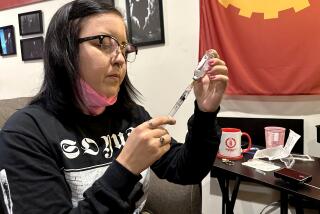New Self-Care for Prevalent Ailment
Living With Diabetes: The Revolutionary Self-Care Program Developed By Rockefeller and Cornell University Researchers by Genell J. Subak-Sharpe (Doubleday: $16.95).
Dr. Lois Jovanovic, her insulin pump cleverly concealed in the folds of a scarf she wears around her waist (its tubing leads to a syringe implanted in her abdomen) walks briskly into the room at the Rockefeller Institute in New York, where a group of diabetics is enrolled in the self-care program.
“Where is it?” they demand.
But Jovanovic isn’t here to play Twenty Questions. In this one-week session, patients will learn to take complete charge of their condition. The author uses this group as a central example of a new regimen in managing diabetes, a condition that affects 20 million Americans.
Meeting Body’s Needs
Under Jovanovic’s and other doctors’ instruction, they will monitor their individual blood-glucose level, calculate individual insulin doses based on a body-weight formula, then inject themselves, usually several times a day, to meet the body’s changing needs.
In addition, they’ll learn how to choose a diet that suits individual food preferences and life style. Only two in this particular group, suffering from Type I or juvenile-onset diabetes, where the pancreas no longer produces insulin, will require the implantation of an insulin pump, a medical procedure undertaken in a hospital.
“Revolutionary” is not an overstatement because patients will be taught how to take their own blood samples, blood being a more “accurate and meaningful” indicator than urine samples. Using a tiny, tape-recorder-size blood-glucose meter, patients will also be able to decide on what foods can be consumed each day, including very moderate amounts of previously verboten wine or alcoholic beverages and ice cream. Each person’s regimen will be different, and self-care sessions will end with extensive psychotherapy because the future is going to be demanding.
Hefty Bonuses
But there are hefty bonuses. Diabetics, whose lives have been a roller coaster of too little or too much insulin, can “achieve a tight blood sugar level.” Women can have successful pregnancies, and athletes will find they can pursue their sports with far less fatigue.
Most significantly, this program--to be used under strict medical supervision--promises new freedom for diabetics in managing their own treatment.




